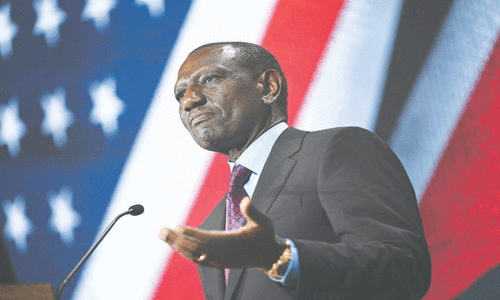BAGHDAD, June 9: The UN Security Council's resolution on Iraq angered many Kurds in the country on Wednesday, while on the ground guerillas set ablaze two oil pipelines.
The UN Security Council on Tuesday endorsed the June 30 hand over of political power in Iraq but its long-awaited blueprint made no reference to the Transitional Administrative Law (TAL), a temporary constitution passed in March, prompting one Kurdish minister to threaten her resignation.
Iraq's Kurdish minority worries that the omission threatens the guarantees of self-rule enshrined in the law, drawn up to map out the country's immediate future. But the incoming caretaker government dismissed fears that cracks were emerging in its ranks due to the Kurds' anger even before it becomes sovereign.
Government spokesman Gurgis Sada declared that Iraqi leaders were fully committed to the interim law and did not need the backing of a UN resolution. "The government agrees 100 per cent on the TAL, and the president, his deputies and the prime minister are working and doing all their responses according to the TAL," Mr Sada said.
"I think that will make her happy," he said, referring to public works minister Nasreen Barwari, who he said had threatened to step down from the government if commanded by her leaders.
The interim law, considered among the most progressive legal documents in the Middle East, enshrines a bill of rights, the first-ever quota of women in a future parliament and the establishment of Iraq as a federal state - the key desire for the north-based Kurds.
Speaking to newsmen earlier, Ms Barwari had said: "As a Kurd and as a woman I am disappointed that it (the UN resolution) does not recognize the TAL as a future basis for a constitution."
But the resolution was warmly welcomed by Iraq's Shias, who largely opposed the interim law, which many see as drawn up by an unelected body. "Praise God, the new resolution of the UN Security Council does not mention the fundamental law," said Laith al Mussawi, an official from Najaf who is close to the Marjaiya, the highest Shia authority.
It was also hailed by Prime Minister Iyad Allawi as heralding the return of full sovereignty on June 30. "It's a great day that future generations will remember as the day when Iraq has transferred from the era of occupation to a new era and got back its complete sovereignty," Mr Allawi, also a Shia, told reporters. -AFP













































Dear visitor, the comments section is undergoing an overhaul and will return soon.